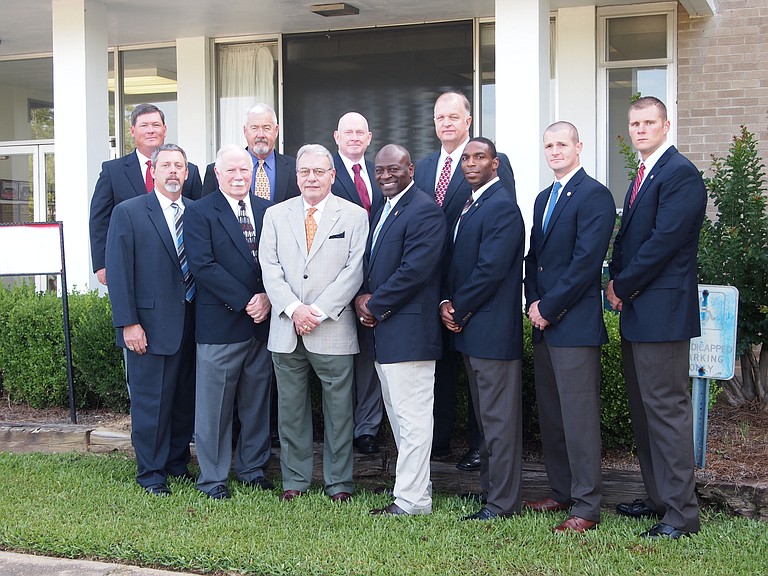Members of the Mississippi Law Enforcement Officers Training Academy include (front row, left to right) Mike Adcox, Ray Prouty, Joe Jackson, Thomas Tuggle, Brian Buckley, Patrick Wall, Neil Tadlock, (back row, left to right) Dan Rawlson, Phillip Hemphill, Ron Crew and Pat Cronin.
Wednesday, July 16, 2014
In the summer of 2013, Ron Crew, instructor and coordinator at the Mississippi Law Enforcement Officers Training Academy, went on a mission trip to Thailand, where his eyes were opened to the horrors of human trafficking. He returned home with a new awareness of interpersonal violence and a determination to prevent it in Mississippi.
Through mutual friends, Crew met Sandy Middleton, and he and the Center for Violence Prevention "got their heads together" to improve officer training in areas of interpersonal violence. In July 2013, the human trafficking laws in the state were improved. "It was obvious we weren't getting significant training," Crew says.
The MLEOTA was constructed in Pearl, in 1966 when the state Legislature enacted a law that made police training mandatory. With access to as many as 80 officers in training, the academy's efficiency could be the difference between life or death for a victim. Crew says that for years, the attorney general's office has been pushing for more in-depth officer training. The police academy had just expanded its training with the passing of House Bill 1030, which strengthened domestic violence laws, but Crew and other leaders wanted to do more. Recent changes to training involve practical skills. The officers in training role-play to learn how to "de-escalate, stay safe and keep people safe from each other," Crew says.
The students are also taught to look for warning signs and make appropriate arrests. Those signs include noticing that someone never leaves the house alone, is always looking down or seems suddenly different in their behavior, and shows any signs of battering on his or her body.
As for the unfamiliar territory of human trafficking, the academy offered three different seminars last fall. Crew's efforts in educating future officers about domestic violence and investigating sex trafficking in Mississippi earned him a spot on the Center for Violence Prevention's advisory board earlier this year.
Crew gives much of the credit for the academy's progress to the state attorney general's office, which sends staff to educate the trainees to deal with cases that involve interpersonal violence. Increasing this training, Crew says, is vital to the safety of citizens and officers.
"Domestic violence is one of the most dangerous calls officers can go on," he says. The next step for the academy is establishing in-service training. "The initial training that they're getting here at the academy is good, but there still needs to be in-service training that's mandated manually to keep the officers up to date on statutes and trends, because everything changes. Continuing education would be one way."
The proactive nature of the center motivates Crew to take the same stance in his instruction. "The more the public is made aware, the more intervention can happen and keep the violent act from happening," he says.
While interpersonal violence is not an issue that can be eliminated entirely, Crew believes that the extensive training is making a difference in Mississippi.
The JFP Chick Ball will honor the academy with one of three Hero awards Saturday, July 19, at 8 p.m. All event details are here.

Comments
Use the comment form below to begin a discussion about this content.
Sign in to comment
Or login with:
OpenID